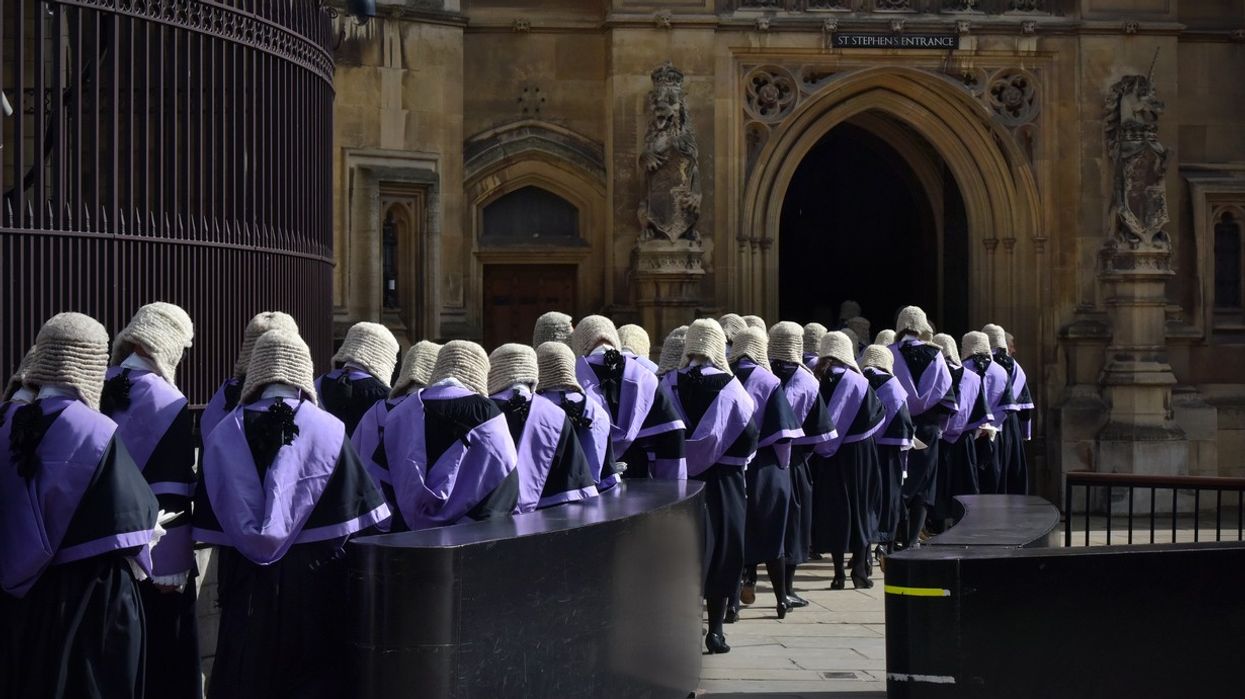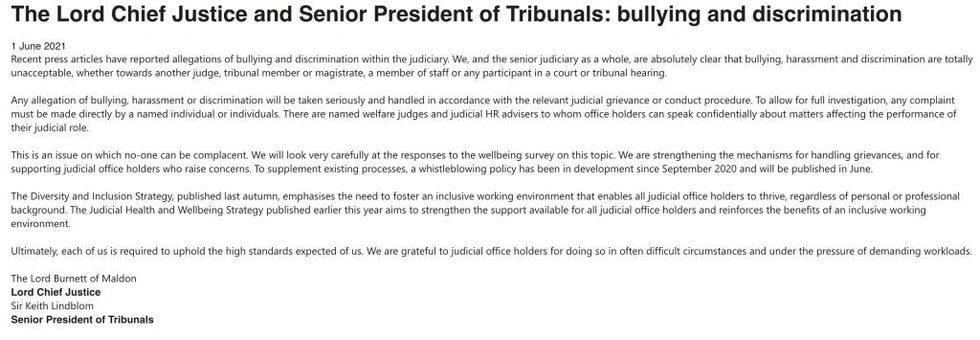Justices told anonymous bullying and racism complaints will not be investigated
Exclusive
Ethnic minority judges have told Eastern Eye they have no hope of securing justice for themselves against bullying and racism in the UK judiciary.
Their comments come after the lord chief justice, Lord Burnett of Maldon, and Sir Keith Lindblom, the senior president of tribunals, wrote to judges that anonymous complaints will not be investigated.
They also told them that a whistle blower policy would be published later this month.
But non-white judges have dismissed the message as “disgusting and meaningless”.
“We have tried to complain, and we are literally destroyed for doing so,” said one judge, who spoke on the condition of anonymity.
“I am disgusted by the lord chief's letter. I am being bullied by everyone. There is no independence and no challenge, just the indication that the purpose of any investigation is to safeguard the careers and reputations of those complained of.”
Whistle blowing
Judges have also told Eastern Eye that a new whistle blowing policy, which senior leaders started to write in September 2020, has been compiled in secret.
It follows a campaign by this newspaper which first revealed a culture of fear, bullying and racism in the judiciary last July and a follow-up investigation in April.
In October 2019, the Supreme Court ruled that District Judge Claire Gilham was a whistle blower. She won a seven-year court battle after being sacked for complaining about bullying and racism in her profession.
Gilham had previously told Eastern Eye the judiciary “actually destroys its records and doesn’t do proper investigations”.
But one ethnic minority judge revealed Gilham had not been consulted about the new policy “and isn’t being allowed to see it before it’s published”.
“This is a secret new policy, and no-one is allowed to see it,” they said. “We believe it will be kept secret, channelled away so it can be dismissed once it’s made public.
“We think it will mean that anyone who speaks out in public will be sacked. They already did that with Claire.”
The district judge was later reinstated after her court victory.
Need for anonymity
Judges we have spoken to want MPs to investigate their claims and said there would be a “plethora of whistle blowers willing to give evidence if they could be protected”.
But senior judicial leaders will not accept anonymous complaints.
“Any allegation of bullying, harassment or discrimination will be taken seriously and handled in accordance with the relevant judicial grievance or conduct procedure,” they wrote.
“To allow for full investigation, any complaint must be made directly by a named individual or individuals.”
Eastern Eye told the lord chief justice’s office last year that judges of all ethnicities do not feel confident about complaining.
Fear and hurt
Judges we spoke to say the judiciary does not understand or accept the level of dissatisfaction, fear or hurt.
“Presiders bully and undermine, belittle and isolate, it is the official presider policy,” complained one.
“Judges up and down the country are made ill and are frightened. Is that the Judiciary we want?”
The email from the country’s most senior judges was sent two days ago (1 June).
“One colleague who’s suicidal and is at risk, was vilified and gaslighted,” said an ethnic minority judge.
“Two judges, a retired Court of Appeal and another retired from the Supreme Court, told them they were unfit to be a judge, that they were a liar and mentally unstable.
“The only possible motive was to either lead to them committing suicide or retiring on health grounds.
“That was the intention of those investigating, even enlisting the help of the complainant’s leadership judge to help them. That same judge has on several occasions sought to force the complainant to leave their court.”
Grievances
The judicial office last updated its grievance policies in 2020, just two years after its previous guidelines.
“This is an issue on which no-one can be complacent,” wrote Lord Burnett and Sir Keith.
“We will look very carefully at the responses to the wellbeing survey on this topic. We are strengthening the mechanisms for handling grievances, and for supporting judicial office holders who raise concerns.”
The 2020 judicial attitudes survey asked 45 questions.
But non-white judges have told Eastern Eye the “wellbeing survey is pointless”.
“It doesn’t ask any questions about whether we’ve faced bullying, racism or discrimination”, said one. “So, what is the point? It’s a box-ticking exercise which isn’t worth the paper it’s written on.
“A number have been suicidal and remain at risk. Judges are bullied and harassed by their leadership judges. Work is moved between courts to destabilise us.
“Remarks are made that indicate that a judge will never be admitted to salaried position or obtain advancement. A practice of divide and rule exists so that tame BAMEs are feted and praised for undermining their colleagues.”
One of the worst accusations is that human resources collude with the senior leadership to undermine judges.
“Work, advancement, leave, deployment, are all controlled,” said one non-white judge we contacted. “HR works for the senior judiciary, breaching confidences, forwarding confidential emails without permission, and laughing and undermining the judges who ask for their help.
“HR actively help to undermine complainants. and are seen to do so.”
Legal expenses
One ethnic minority judge explained complaining is very expensive.
“You’re advised to lawyer up, and that runs into hundreds of thousands of pounds,” they said.
“I know of one who’s facing a bill of £140,000 just for advice and legal submissions. I know the public think we’re minted, but that’s not true.
“Taking out a grievance complaint adds to the cost, and it’s proved to be pretty useless.”
Judges have contacted Eastern Eye to say racism, bullying and discrimination has become worse since we started our campaign last year.
Just two months ago, we revealed how the lord chief justice refused to acknowledge the judiciary had a problem with bullying or racism.
And it seems the email is a reaction to our articles.
“Recent press articles have reported allegations of bullying and discrimination within the judiciary,” wrote the UK’s most senior judicial figures.
“We, and the senior judiciary as a whole, are absolutely clear that bullying, harassment and discrimination are totally unacceptable, whether towards another judge, tribunal member or magistrate, a member of staff or any participant in a court or tribunal hearing.”
But we have previously spoken to judges who
- complained they were victimised, ostracised, and treated as the problem.
- claimed that mainly white judges are chosen to join the elite ranks through informal and powerful ‘establishment’ networks.
- said they are blacklisted if they refused to “play the game” or were viewed as “anti-establishment”.
“Many of us give up careers as silks [Queen’s Counsel] to sit on the bench, and for what?" said one judge.
“This is an Orwellian nightmare. Our country and the Commonwealth deserve so much better."
“Any complaint must be made directly by named individuals"





